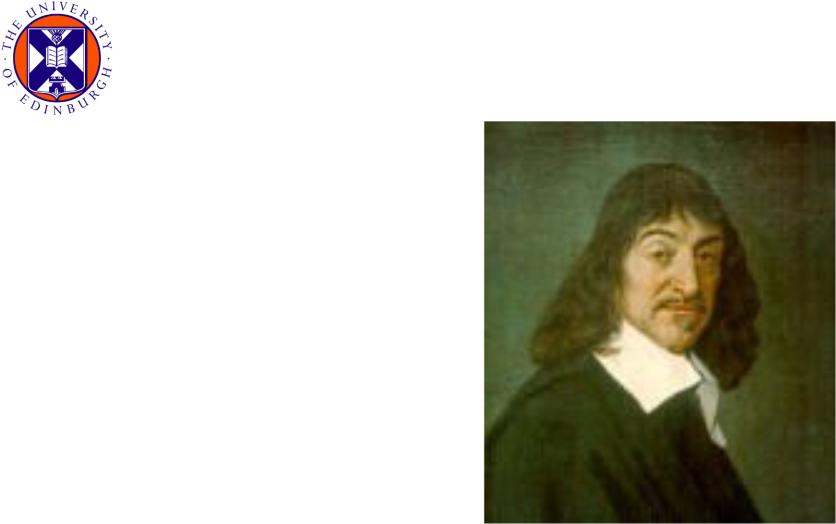
introphil_lecture_slides_IntroPhil2-week2-slides
.pdf
Introduction to Philosophy
WHAT IS
KNOWLEDGE?
(AND DO WE HAVE ANY?)
Professor Duncan Pritchard FRSE
duncan.pritchard@ed.ac.uk www.ppls.ed.ac.uk/people/view/duncan-pritchard-frse
René Descartes (1596-1650)
1
The field of philosophy which explores the nature of knowledge, and related questions (such as the nature of truth, the nature of evidence, the nature of rationality etc.,) is known as epistemology.
2
Structure of the Lecture
Part One: The Basic Constituents of Knowledge
Part Two: The Gettier Problem
Part Three: Do We Have any Knowledge?
3
Part One:
The Basic Constituents of
Knowledge
4
Knowledge in the Information Age
•More than ever, information is widely available to us (most of us, anyway).
•But lots of information by itself is little use unless one can sift the good information from the bad.
•That’s why knowledge is so important.
5
‘Knowledge’ in Everyday Usage
•David knows that the kettle has boiled.
•Suilin knows where the secret compartment is.
•Alasdair knows why the house burned down.
•Matthew knows how to fly an aeroplane.
•Michela knows which route to take.
•Allan knows so-and-so from that TV show.
6
Propositional Knowledge
We are going to focus on a particular kind of knowledge, called propositional knowledge. This is knowledge of a proposition (i.e., knowledge-that something is the case).
7
What is a Proposition?
A proposition is what is expressed by a declarative sentence, which is a sentence that declares that something is the case. A proposition is either true or false.
Some sentences that express propositions:
•The cat is on the mat.
•Your dinner is in the oven.
•The moon is made of cheese.
Some sentences that don’t express propositions: |
|
•Shut that door. |
|
•Yes please. |
|
•How can I help you? |
8 |
|
Propositional versus Ability Knowledge
Knowledge-that: Knowledge-how:
•Knowing that Paris is the capital of France.
•Knowing that the earth orbits the sun.
•Knowing that one has toothache.
•Knowing how to drive.
•Knowing how to play piano.
•Knowing how to beat the stock market.
9
Two Conditions for Propositional Knowledge
One can know a proposition only if:
(i)That proposition is true;
(ii)One believes that proposition.
10
